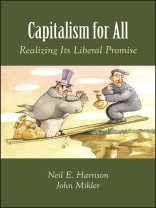Capitalism has lost its glamor. In just three decades since it ‘defeated’ a totalitarian Soviet Union, capitalism is today blamed for slowing growth, a dangerously changing climate, inequality, social misery, and a rise in nationalist populism. How did capitalism fall so far from grace?
Capitalism for All show how, quite simply, the governments of the world’s wealthiest countries have forgotten capitalism’s initial purpose. It was born out of a liberal philosophy that values the competition of ideas and goods in the service of social progress while respecting the individual and preventing excessive power. Yet, with the aid of governments, giant corporations, or ‘Mega Corps, ‘ have usurped power, dominated markets, and reduced competition. The result is not liberal capitalism but what Neil E. Harrison and John Mikler term ‘Corpo Capitalism, ‘ which results in an unhappy populace seeking radical political change while challenges like climate change continue to race forward largely unchecked.
Capitalism for All explores how Corpo Capitalism came to be, argues that it is not inevitable, and explains how governments can wrest back power and create a capitalism for all.
İçerik tablosu
List of Illustrations
Acknowledgments
1. The Fading Promise of Capitalism
Liberalism and Capitalism
Part I: The Promise of Liberalism
2. What’s Been Lost: The Dream of Liberalism
About Freedom
Liberalism, Democracy, and Capitalism
Liberalism as an Idea
Liberal Capitalism
3. The Present and Future Challenges of Liberalism
Governing Happiness
Climate Change
AI, ICT, and Automation
Preparing for a Liberal Future
Part II: Losing Liberalism
4. Mega Corps: Malefactors of Great Wealth
Mega Corps, Not Markets
National Corpo Capitalism, Not Global (Neo)liberalism
Changing the Debate
5. Corpo Capitalism and the Misery of Work
The Misery of Work from Rich to Poor Countries
The Potential for Self-Regulation
Who Governs?
Get Back in the Regulatory Ring
6. Providing for Individual Wellbeing
Social Welfare
Varieties of Welfare States
The Future of the Liberal Welfare State
7. Taxation and Representation
The Business of Business
The Business of Government Is Business
The Role of Government Is Representing Its Citizens
Making Government and Business Work for Society
Part III: A Liberal Correction
8. Capitalism and Its Discontents
Inequality and Slow Growth
Inequality and Wellbeing
Inequality and Social Mobility
Damaged Democracy and the Role of Government
9. Technological Innovation for the People
The Market Innovation Process
National Innovation Systems
A Mission for Climate Change
From Mission to Innovation
Innovation and Society
Government Governing
10. The Purpose of the Economy
Democracy by Mega Corps or for the People
Economic Efficiency or Fairness
Preventing Climate Catastrophe
Wealth and Capital
Balancing Incomes
Government to the Rescue
11. The Purpose of the Politics
Controlled Markets, but Not Powerless Governments
Liberal Values
Liberal Values in Practice
Climate Change
The Welfare State
Social Responsibility
Technological Innovation
Building Better States
12. The Resilience of Liberal Capitalism
About Resilience
The Fragility of Corpo Capitalism
The Resilience of Liberal Capitalism
Governance for Resilience
Resilience through Liberal Capitalism
13. Progressing to Liberal Capitalism
Dynamism and Institutions
Releasing the Death Grip
Notes
Bibliography
Index
Yazar hakkında
Neil E. Harrison is Founder and Executive Director of The Sustainable Development Institute in Colorado. He is the author of several books, including
Sustainable Capitalism and the Pursuit of Well-Being.
John Mikler is Associate Professor in the Department of Government and International Relations at the University of Sydney, Australia. He is the author and editor of several books, including coeditor (with Karsten Ronit) of
MNCs in Global Politics: Pathways of Influence.












